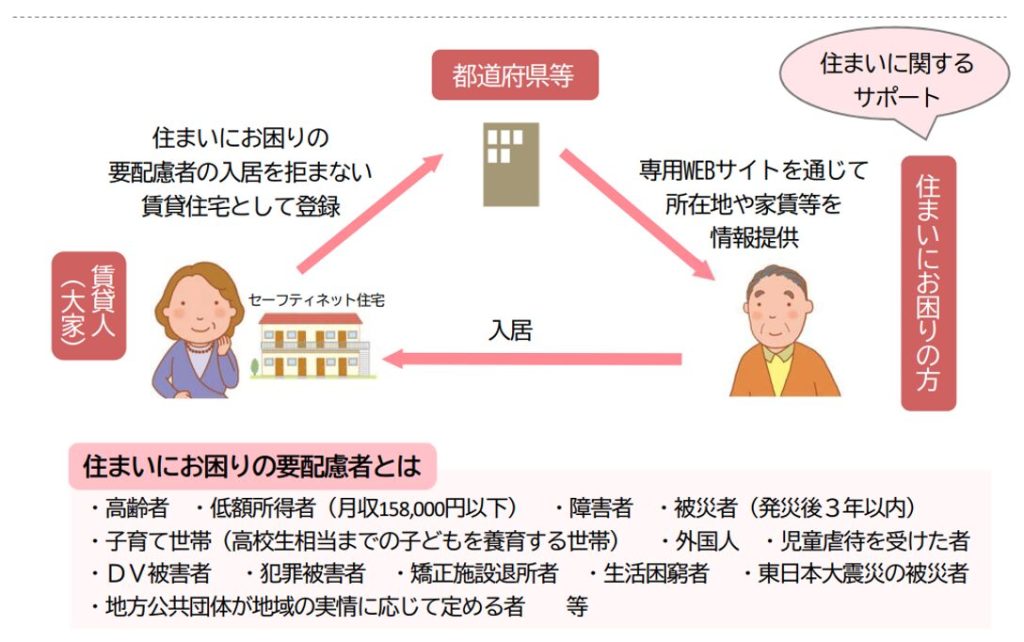Original Article: 【差別的取扱いの禁止と合理的配慮が義務化】理解を深めておきたい改正のポイント
Key Points of Amendment to be Understood
As of April 1, 2024, it has become mandatory for businesses to provide “reasonable accommodation” to persons with disabilities.
All businesses, regardless of size, that conduct business with the intention of continuing to do so are subject to this requirement, which naturally includes us, real estate agents.
This law was enacted in June 2013 as the “Law for the Elimination of Discrimination against Persons with Disabilities (Law for the Promotion of the Elimination of Discrimination on the Basis of Disability ). Previously, the provision “to provide reasonable accommodation at the request of persons with disabilities to the extent that it is not too burdensome” was only an effort obligation, but the amendment has made it mandatory.
If a business operator repeatedly violates the stipulation, in the opinion of the government, it is difficult to expect voluntary improvement, the business operator may not only be required to report the violation, but may also be given advice, guidance, or recommendations.
We real estate agents are involved in house and land transactions where people live, whether for rent or for sale.
Therefore, we need to be more considerate compared with other types of businesses. We are required to give the same consideration to people with disabilities, the elderly, single mothers, to the LGBTQ community, and so on and so forth.
In reality, however, every time there is a news report about the difficulty of finding a property for a person with special needs, we real estate agents are accused of being on the “side that doesn’t rent”.
Even if you want to respond, “the rental owner will not agree.” In some cases, “rent guarantee companies will not approve.” Especially in convenient living areas, you may not find a reason to rent properties to people with housing security considerations (such as low-income earners, the elderly, disaster affected victims, in addition to people with disabilities).
An intermediary contractor is only an intermediary, and cannot introduce a property without the lender’s approval. In the end, a mismatch between a lender and a borrower occurs, and we struggle between them.
Some agencies may shy away from this because they are concerned about the risk of undertaking problems with adjacent units, delinquent rent, and communication problems.
From now on, such discriminatory treatment is prohibited and a duty of reasonable accommodation has been imposed upon us. We need to understand exactly what this duty is and respond appropriately.
In this blog, we will explain what the duty of reasonable accommodation is and how we should respond to it in the future.
Only those who respond flexibly will survive
We need to face the current situation of real estate agencies.
Teikoku Databank announced on March 2, 2024 that the number of bankruptcies of intermediaries increased by 70% in 2023 compared to the previous year.
The press release was headlined, “Real estate brokerage bankruptcies soar, record high,” and attracted attention as the number of bankruptcies in a year was the highest ever.
The main reason for this is that since the pandemic, there has been a decrease in transfers (work) due to changes in work styles, and the number of contracts has also decreased, resulting in a deterioration in profits. In addition, it has been pointed out that the number of bankruptcies of businesses that have delayed the introduction of advanced technologies, such as information dissemination using DX and online previews, is increasing.
The report also touches on the movement to retain relatively new, high-quality properties, and concludes that the disparity between large and small-to-medium-sized properties is expected to widen in the future, and that there is a possibility that there will be a further weeding out of agents who have lost out on these opportunities.
There is a saying when it comes to stock investing: “There is a path behind every other person’s path to a mountain of flowers.” This term applies to all industries, not just real estate.
If you change your perspective a little, your opportunities will expand.
While it is true that the number of transfers is decreasing, the number of people who have difficulty in renting a property, so to speak, “people with housing security concerns,” continues to increase.
Some real estate service providers have achieved stable business results by providing housing counseling and post-occupancy support to people with housing security concerns.
LIFULL HOME’S, a leading real estate and housing service provider, operates a platform called FRIENDLY DOORS.
https://actionforall.homes.co.jp/friendlydoor
The platform allows people with disabilities, as well as foreign nationals, LGBTQ community, the elderly, and others of various backgrounds and attributes, to search for real estate agencies that are non-judgmental and supportive when renting.

The platform received the Minister of Internal Affairs and Communications Award (ACC Grand Prix) in the “Marketing Effectiveness” category and two other awards (three in total) at the Creative Awards 2022, one of the largest creative awards in Japan.
The number of registered real estate agencies on the platform is increasing, and it has become a place where a variety of potential tenants can find a home, while at the same time promoting its high level of expertise.
Providing reasonable accommodation and discriminatory treatment
The aforementioned platform includes the statement “Although we are a friendly and accommodating real estate company, there may be no properties we can introduce to you.“
Even if we want to be conscientious, we cannot introduce a room if the rental owner is not convinced. This is our challenge.
We need to persuade the owner to agree.
Owners, whether corporate or individual, who repeatedly and continuously rent their properties are obligated to “provide reasonable accommodations”. You may want to explain this to them when persuading them to rent you a room.
To do this, you need to understand exactly what “providing reasonable accommodation” pertains.
Reasonable accommodation means that when a person with a disability indicates that he/she would like a social barrier to be removed, reasonable accommodations necessary to remove the barrier are made to the extent that the burden associated with implementation is not excessive.
Business operators are required to meet the following three requirements in light of the purpose, content, and function of the project;
- Limited to those incidental to the original business to the extent necessary.
- The purpose is to receive equal opportunities when compared with people without disabilities.
- Does not amount to essential changes in the purpose or function of administrative work or business.
As a specific example, let us assume the case of a person listening to a conversation at a reception desk.
A wheelchair user requests to be seated in a wheelchair, so the chair is cleared away to make room for the wheelchair user to be seated. This constitutes reasonable accommodation.
Also, a person who is hard of hearing and also has low vision requested written communication, and requested that it be difficult to distinguish letters with a thin pen, so we responded by writing large letters with a thick pen.
Thus, it is necessary to respond to requests from people with disabilities to the extent that they do not create an overburden.
In other words, if there is an underlying spirit of “compassion” and “caring,” there is no need to worry.
Therefore, special treatment is not necessary. Excessive treatment can be rude.
What is required is only to remove obstacles as requested. If a document that can be written on behalf of the applicant is requested to be filled in, the applicant is asked to confirm the contents of the document while responding to the request.
This includes using tablets and other devices to facilitate communication.
If such a response is required, some employees may feel that it is an “excessive burden.”
There are no clear criteria for determining “excessive burden.” There is no choice but to judge each individual case comprehensively and objectively, depending on the specific circumstance.
There is no problem as long as it is incidental to the original job and provided with the same opportunities as those without disabilities.
Moreover, since it is not anticipated that the company will be burdened with an excessive burden, there is no need to go as far as to make essential changes to the purpose, content, or functions of the business.
Care must also be taken against unfair and discriminatory treatment.
Acts such as refusing to provide services without justifiable reasons, or restricting the location and time, is discrimination, not only to people with disabilities, but also to foreign nationals, to the LGBTQ community, the elderly, etc.
Consideration must be taken to avoid discriminatory treatment of people with various backgrounds.
This form of refusal is unacceptable
The disabilities covered by the law are stipulated in Article 2, Item 1 of the Basic Law for Persons with Disabilities.
Specifically, the law covers people with physical disabilities, intellectual disabilities, mental disabilities (including developmental disabilities and higher brain dysfunction), and psychosomatic dysfunction (including disabilities caused by intractable diseases), who continuously suffer considerable limitations in their daily and social lives due to these barriers.
Therefore, they are not limited to holders of the “disability certificate.”
Refusing to provide services to a person with a disability requires a comprehensive and objective judgment in specific situations and circumstances.
At the very least, the decision must take into consideration such factors as safety, preservation of property, the purpose and content of the business, maintenance of functions, and prevention of damage. Therefore, the decision should not be made subjectively, but should be objective and convincing from the standpoint of a third party.
Therefore, the following refusal is not appropriate;
- “We have no experience or precedent in the transaction, so we can’t handle it.”
- “We cannot give special treatment just because a law has been enacted.”
- “We cannot introduce you to people who are concerned about the risks involved.
There may be reasons for refusing, such as there is no precedent or lack of know-how, it would be troublesome to be asked to provide a service beyond that for a typical customer, or it would be impossible to respond given the risks.
However, it is prohibited to refuse a contract based on a disability without negotiating with the lessor or rent guarantee company or making necessary adjustments to the contract. The same applies to refusing a person who uses a wheelchair based on a subjective judgment without making any adjustments to see if they can view the property while in a wheelchair.
In addition, requests for written pledges that are not normally used due to disability are also prohibited.
Prohibitions against reasonable accommodation and discriminatory treatment are not overburdening. It is necessary to accurately understand the context.
Utilization of safety-net housing
There will be cases where you receive a consultation from a person with housing security considerations and cannot find a property to introduce them to.
In such cases, the Safety Net Housing System can help.

https://www.safetynet-jutaku.jp/guest/index.php
In principle, the properties listed on the platform are those that do not refuse occupancy by persons requiring special consideration for housing security.
However, there may be cases in which the range of acceptable tenants (e.g., the elderly or victims from natural disasters are not refused) is limited, so you need to confirm the details of the property before introducing them.

If you are unable to attract tenants for reasons such as the building being old, you may suggest that the rental owner register it as a safety net home.
In order to be registered, in addition to meeting certain standards regarding size and structure, it is also required to have earthquake resistance (it is possible for local governments to strengthen and soften the supply by establishing a supply promotion plan). If renovation is necessary, a subsidy system has been established to cover the cost. The amount (1/3 of the cost required for renovation work and the number of eligible households multiplied by 500,000 yen, etc.) and details can be found on the websites of local governments.
In addition, in many cases, it is required to use a guarantor or guarantor company when signing a rental contract, but for safety net housing, rent guarantees are provided by a housing support corporation (a corporation that provides housing support based on the Housing Safety Net Act). It may be possible to use it, so please check it out as well.
Summary
In this issue, we explained the “provision of reasonable accommodation” for persons with disabilities, which will become obligatory as of April 1, 2024. At the same time, we also introduced the social significance that real estate agents should fulfill for persons with housing security.
When consulting with persons with housing security, real estate agents tend to shy away from such requests because of preconceived notions such as “it’s too much trouble,” “I don’t have the know-how,” and “I don’t want to cause problems.” However, we should also consider the widening gap between large companies and small and medium-sized companies, and the possibility of losing the opportunity and present and future business as well.
According to the “Research Study Report on the State of Small and Medium Real Estate Agents” published in March 2021, approximately 80% of agents are small businesses with 3 employees, and those with less than 10 employees account for approximately 90%. On the other hand, only 0.1% have 51 or more employees.
Despite this, the current situation of intermediary agencies points out the disparity between large and small businesses.
If they remain “real estate agents in town” with no distinctive features, it will be difficult for them to adapt to the ever-accelerating development of real estate DX and the declining population.
With that said, we need to recognize that implementing a system that other companies have adopted successfully in our own company will not necessarily bring success. Haphazard solutions will not solve the problem.
Let’s go back to the starting point and aim for “customer satisfaction proportional to results.” In other words, the number of “thank yous” will increase sales.
It is important to change our way of thinking in order to solve the contradiction of the increasing number of vacant houses and the increasing number of people in need who cannot afford to rent a property.
To understand the current situation and differentiate ourselves from our competitors, it is essential that we are always willing to keep learning.

For additional information or any questions please contact us here
Email: info@remax-apex.com

